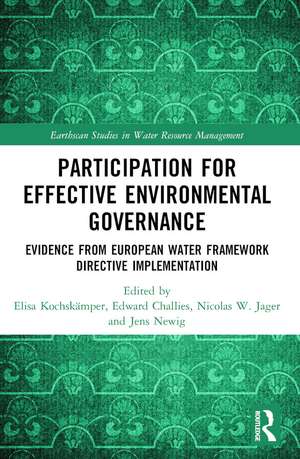Participation for Effective Environmental Governance: Evidence from European Water Framework Directive Implementation: Earthscan Studies in Water Resource Management
Editat de Elisa Kochskämper, Edward Challies, Nicolas W. Jager, Jens Newigen Limba Engleză Paperback – 20 mai 2019
It draws on evidence from WFD implementation in eight case studies from Germany, Spain and the United Kingdom on the basis of a matched comparative case study design. The Directive sets common timeframes and procedural requirements, which provides a perfect test-bed and unique opportunity to study the effects of participation on implementation and outcomes in comparative perspective.
| Toate formatele și edițiile | Preț | Express |
|---|---|---|
| Paperback (1) | 268.83 lei 6-8 săpt. | |
| Taylor & Francis – 20 mai 2019 | 268.83 lei 6-8 săpt. | |
| Hardback (1) | 763.23 lei 6-8 săpt. | |
| Taylor & Francis – 16 oct 2017 | 763.23 lei 6-8 săpt. |
Din seria Earthscan Studies in Water Resource Management
-
 Preț: 378.67 lei
Preț: 378.67 lei -
 Preț: 326.49 lei
Preț: 326.49 lei -
 Preț: 311.39 lei
Preț: 311.39 lei -
 Preț: 155.44 lei
Preț: 155.44 lei - 8%
 Preț: 389.10 lei
Preț: 389.10 lei -
 Preț: 310.12 lei
Preț: 310.12 lei -
 Preț: 256.04 lei
Preț: 256.04 lei -
 Preț: 312.20 lei
Preț: 312.20 lei -
 Preț: 279.32 lei
Preț: 279.32 lei -
 Preț: 326.26 lei
Preț: 326.26 lei -
 Preț: 470.90 lei
Preț: 470.90 lei - 18%
 Preț: 1060.25 lei
Preț: 1060.25 lei -
 Preț: 491.82 lei
Preț: 491.82 lei - 10%
 Preț: 311.38 lei
Preț: 311.38 lei - 18%
 Preț: 1000.27 lei
Preț: 1000.27 lei -
 Preț: 479.19 lei
Preț: 479.19 lei -
 Preț: 442.68 lei
Preț: 442.68 lei - 18%
 Preț: 1000.27 lei
Preț: 1000.27 lei - 18%
 Preț: 1056.32 lei
Preț: 1056.32 lei - 18%
 Preț: 1054.71 lei
Preț: 1054.71 lei - 18%
 Preț: 1064.70 lei
Preț: 1064.70 lei - 18%
 Preț: 1001.84 lei
Preț: 1001.84 lei - 18%
 Preț: 1052.38 lei
Preț: 1052.38 lei - 25%
 Preț: 767.07 lei
Preț: 767.07 lei - 18%
 Preț: 1003.93 lei
Preț: 1003.93 lei - 18%
 Preț: 1056.00 lei
Preț: 1056.00 lei -
 Preț: 469.34 lei
Preț: 469.34 lei - 18%
 Preț: 1173.90 lei
Preț: 1173.90 lei -
 Preț: 485.46 lei
Preț: 485.46 lei - 18%
 Preț: 1009.74 lei
Preț: 1009.74 lei - 31%
 Preț: 763.23 lei
Preț: 763.23 lei - 31%
 Preț: 764.22 lei
Preț: 764.22 lei - 12%
 Preț: 312.43 lei
Preț: 312.43 lei - 18%
 Preț: 730.71 lei
Preț: 730.71 lei - 12%
 Preț: 325.34 lei
Preț: 325.34 lei - 31%
 Preț: 765.36 lei
Preț: 765.36 lei -
 Preț: 409.31 lei
Preț: 409.31 lei -
 Preț: 416.22 lei
Preț: 416.22 lei -
 Preț: 483.49 lei
Preț: 483.49 lei - 18%
 Preț: 1001.84 lei
Preț: 1001.84 lei
Preț: 268.83 lei
Preț vechi: 339.65 lei
-21% Nou
Puncte Express: 403
Preț estimativ în valută:
51.45€ • 53.51$ • 42.47£
51.45€ • 53.51$ • 42.47£
Carte tipărită la comandă
Livrare economică 14-28 aprilie
Preluare comenzi: 021 569.72.76
Specificații
ISBN-13: 9780367352363
ISBN-10: 0367352362
Pagini: 180
Ilustrații: 39
Dimensiuni: 156 x 234 mm
Greutate: 0.27 kg
Ediția:1
Editura: Taylor & Francis
Colecția Routledge
Seria Earthscan Studies in Water Resource Management
Locul publicării:Oxford, United Kingdom
ISBN-10: 0367352362
Pagini: 180
Ilustrații: 39
Dimensiuni: 156 x 234 mm
Greutate: 0.27 kg
Ediția:1
Editura: Taylor & Francis
Colecția Routledge
Seria Earthscan Studies in Water Resource Management
Locul publicării:Oxford, United Kingdom
Public țintă
Postgraduate and UndergraduateCuprins
Part I Concepts and research design 1. Researching participation in environmental governance through the implementation of the European Water Framework Directive 2. Concepts: How participation leads to effective environmental governance 3. Paired case research design and mixed-methods approach Part II Empirical case studies of participatory water governance 4. Stakeholder involvement for Water Framework Directive implementation in Germany: Three case studies from Bavaria, Lower Saxony and Schleswig-Holstein 5. Stakeholder and citizen involvement for Water Framework Directive implementation in Spain: Three case studies from Andalusia, Cantabria and Catalonia 6. Stakeholder engagement in Water Framework Directive planning in the United Kingdom: Two case studies from Northern Ireland and Scotland Part III Comparative Analysis and Conclusions 7. Impact of participation on sustainable water management planning: Comparative analysis of eight cases 8. Participation and Effective Environmental Governance: Causal mechanisms, and beyond
Notă biografică
Elisa Kochskämper is a Research Associate with the Research Group on Governance, Participation and Sustainability at Leuphana University Lüneburg, Germany.
Edward Challies is Senior Research Associate with the Research Group on Governance, Participation and Sustainability, at Leuphana University Lüneburg, Germany. Jens Newig holds a chair in governance and sustainability at Leuphana University Lüneburg, Germany, affiliated with the university's Faculty of Sustainability and its Center for the Study of Democracy. Nicolas W. Jager is a postdoctoral Research Associate in the Research Group on Governance, Participation and Sustainability, at Leuphana University Lüneburg, Germany.
Edward Challies is Senior Research Associate with the Research Group on Governance, Participation and Sustainability, at Leuphana University Lüneburg, Germany. Jens Newig holds a chair in governance and sustainability at Leuphana University Lüneburg, Germany, affiliated with the university's Faculty of Sustainability and its Center for the Study of Democracy. Nicolas W. Jager is a postdoctoral Research Associate in the Research Group on Governance, Participation and Sustainability, at Leuphana University Lüneburg, Germany.
Descriere
Drawing on evidence from implementation of the European Water Framework Directive (WFD) in eight case studies, this book examines a range of approaches to participatory river basin management planning, and considers how participation impacted on the environmental standard of planning documents, quality of implementation, and social outcomes.
